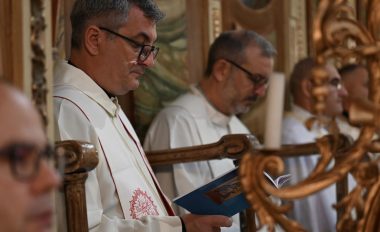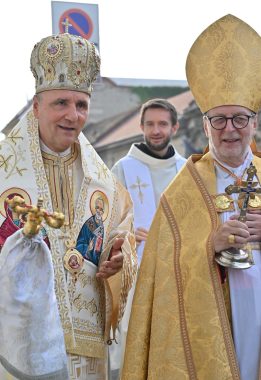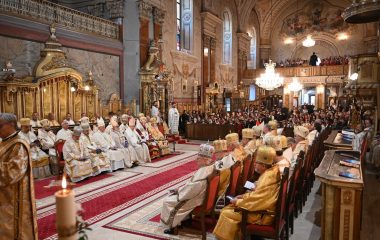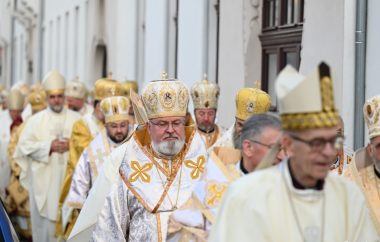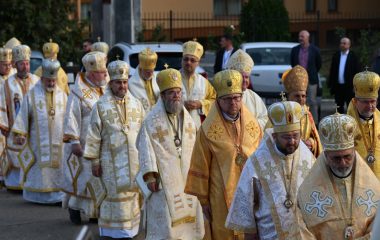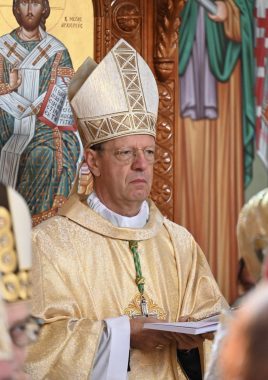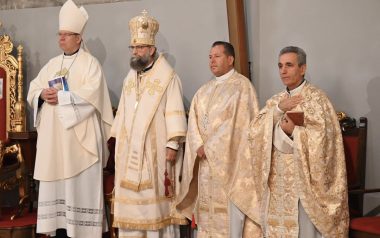The 25th Meeting of Eastern Catholic Bishops of Europe took place in Oradea, Romania, from September 16 to 19, 2024, entitled: “The Relationship Between Bishops and Priests – Fraternity and Humanity. Synod on Synodality”. The meeting was organized under the auspices of the Council of European Bishops’ Conferences (CCEE), on the invitation of Msgr. Virgil Bercea, Bishop of the Greek-Catholic Eparchy of Oradea. The meeting was attended by sixty bishops and priests representing the Eastern Catholic Churches from Ukraine, Hungary, Slovakia, Cyprus, Belarus, Italy, Greece, France, Austria, Spain, Bulgaria, Turkey, North Macedonia, Serbia, Croatia and Romania. Latin-rite Catholic bishops from the Bishops’ Conference of Romania and Moldova were also present. Also present were H.E. Cardinal Claudio Gugerotti, Prefect of the Dicastery for the Eastern Churches; H.E. Msgr. Giampiero Gloder, Apostolic Nuncio to Romania and Moldova; and H.E. Msgr. Gintaras Grušas, President of the Council of European Bishops’ Conferences (CCEE).
The official inauguration took place in the afternoon of September 16, 2024, in the Honor Hall of the City Hall of Oradea. Were Also here aldo H.E. Msgr. Sofronie Drincec, Orthodox Bishop of Oradea, other representatives of the various Christian communities in Oradea, H.E. Ciprian-Vasile Olinici, State Secretary for Religious Affairs in Romania, and civil authorities. The Major Archbishop of the Romanian Greek-Catholic Church, H.E. Cardinal Lucian Mureșan, sent a special greeting for the occasion.
The meeting was held five years after the beatification of the Romanian Greek-Catholic Bishops who died for their faith during the communist regime. They are the saints of the prisons, the source from which we can draw the love for these places and the strength to move forward.
The central theme inspired the discussions in preparation for the second session of the 16th General Assembly of the Synod of Bishops, scheduled for October 2-27, 2024, in the Vatican. The ongoing war in Ukraine, along with the resulting refugee crisis, remains a constant focus of the Church, as these events present current challenges to the relationship between bishops and their priests, especially in the diaspora.
The testimony of communion among pastors is particularly important for the faith journey and Christian life of our communities and for a living transmission of the Gospel of Christ in our time, marked by wars, divisions, and confrontations, as well as by growing indifference or superficiality toward faith and the Christian message.
In a European context with severe political, social, cultural, and religious challenges, we are all called to strengthen unity and solidarity among our Churches, to give a convincing, love-filled, and hopeful testimony of the Gospel and salvation.
It is important to have good priests, as today’s times are no longer those of persecution, where people were willing to give their lives to maintain the Catholic faith. Today, we face a situation of fragility, clearly visible even in our relationship with our seminarians. Addressing issues such as emotional distance and depression, which affect today’s world, technological developments that challenge Christian values, and the fragility of contemporary families, the centrality of prayer, the relationship with the Word of God, confession, self-reflection, and the moral condition of the bishop, as well as self-discipline, remain crucial.
The proclamation of Christ is central to authentic Christian life. The crisis produces wrong answers: internal secularization threatens to empty the Church itself; a sterile nostalgia for an idealized past that cannot be recovered. The fraternity between bishops and priests “is a participation in the humanity redeemed by Christ” that “requires radical sacrifice and involves the loss of self to find eternal life. At the same time, the fraternity between bishops and priests is a service to all humanity. Priests and bishops must help the faithful live in communion and service, reflecting on the unity and trinitarian love, as communion is the heartbeat of ecclesial life.
Priestly fraternity must be lived with authenticity and humanity: bishops and priests must cultivate their humanity, expressing mutual support, trust, compassion, and forgiveness. It is through this humanity that authentic fraternity is built. As bishops, we are called to live this unity inspired by the Liturgy, for its fruits are the life of sonship that leads us to discover our fatherhood, which comes from the Heavenly Father. We live this fatherhood with priests and collaborators with a spirit of fraternity and human solidarity.
During this meeting, we experienced sacred moments by participating in the Divine Liturgy, which is our life and the source of our unity and love for the world. The Liturgy is the source from which our peace is renewed, and through it, we receive the strength to spread this peace among the people of our countries. The meeting was also an opportunity to get to know the city of Oradea, characterized by a beautiful interfaith dialogue.
In these times, when Europe experiences firsthand the wounds of the war in Ukraine and other parts of the world, communion and solidarity remain central to the faith journey of the different Eastern Catholic Churches of Europe. We raise our voices for truth and justice, and we commit to spreading the light and hope in our hearts.
The next meeting will be held in Vienna, Austria, in September 2025.
Oradea, 19 September 2024


